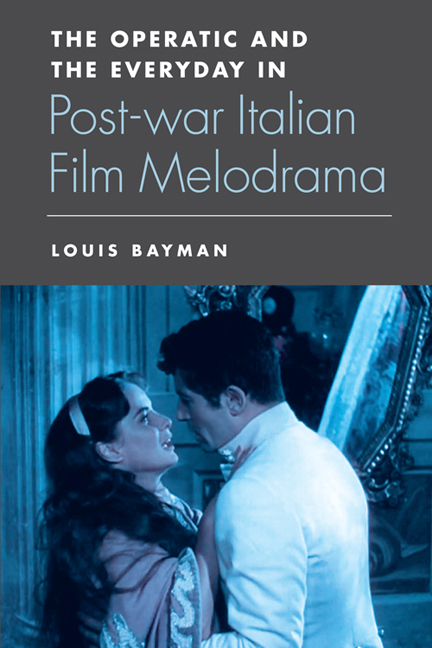Conclusion
Published online by Cambridge University Press: 05 August 2016
Summary
‘There is always some madness in love, but there is also always some reason in madness.’
Petrarch‘But can't you see these things really happen? These events are more real than the facts of life!’ Thus Anna, in Un marito per Anna Zaccheo, describes the melodramatic play to which Andrea takes her on their date, at which his cynicism contrasts with her easy susceptibility to the mythologies of romance. In the direct terms of the plot, her faith in melodrama is proved wrong and Andrea's masculine disavowal right. The play they see includes a shooting and ends with a marriage, while her life for the duration of the film contains neither such drama nor such a happy ending. And yet something more remains, for after the curtain falls Anna does then undergo the full emotional turbulence of a melodramatic narrative. More real, yet not life itself: melodramas channel their formal properties towards elevating, emphasising and intensifying the emotional expressivity that transforms the prose world they emerge from. Such elevation makes prominent the act of dramatic presentation in eliciting an undeniable reality whose proof, if melodrama has done its job most successfully, is found in tears.
As with any other form, melodrama creates its own generic terms through which to reshape reality, through which its situations require themselves to be seen melodramatically. In discussing Rocco e i suoi fratelli, Sam Rohdie puts the melodramatic relationship thus:
Melodrama, by theatricalising reality, reveals it while at the same time revealing the impossibility, the unlivability, of the emotions it calls up, except within melodrama – that is, not in life but in art. The overheated fiction of melodrama becomes simultaneously revelation of the real, protest against it, and salvation from it. (Rohdie 1992: 23)
Thus the gap between expressive elevation and prosaic reality is itself melodramatic. Melodrama heightens the gaps between expression, emotion and reality precisely so as to reinforce their mutual dependence and so as to call for their ever more emphatic manifestation, increasing the gap via the very method through which it tries to close it. The more expression is melodramatised, and the wider the disjuncture between melos (melody or musicality) and drama, the closer it is to the truth of the problem – of the unlivability in real life of the emotions called up by melodrama – which the generic terms of melodrama create.
- Type
- Chapter
- Information
- The Operatic and the Everyday in Postwar Italian Film Melodrama , pp. 182 - 186Publisher: Edinburgh University PressPrint publication year: 2014



